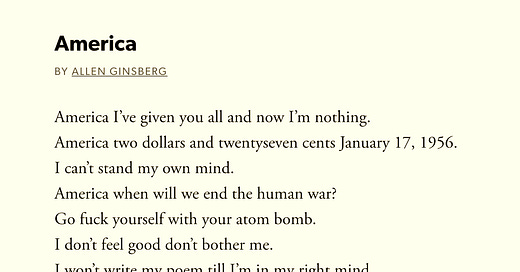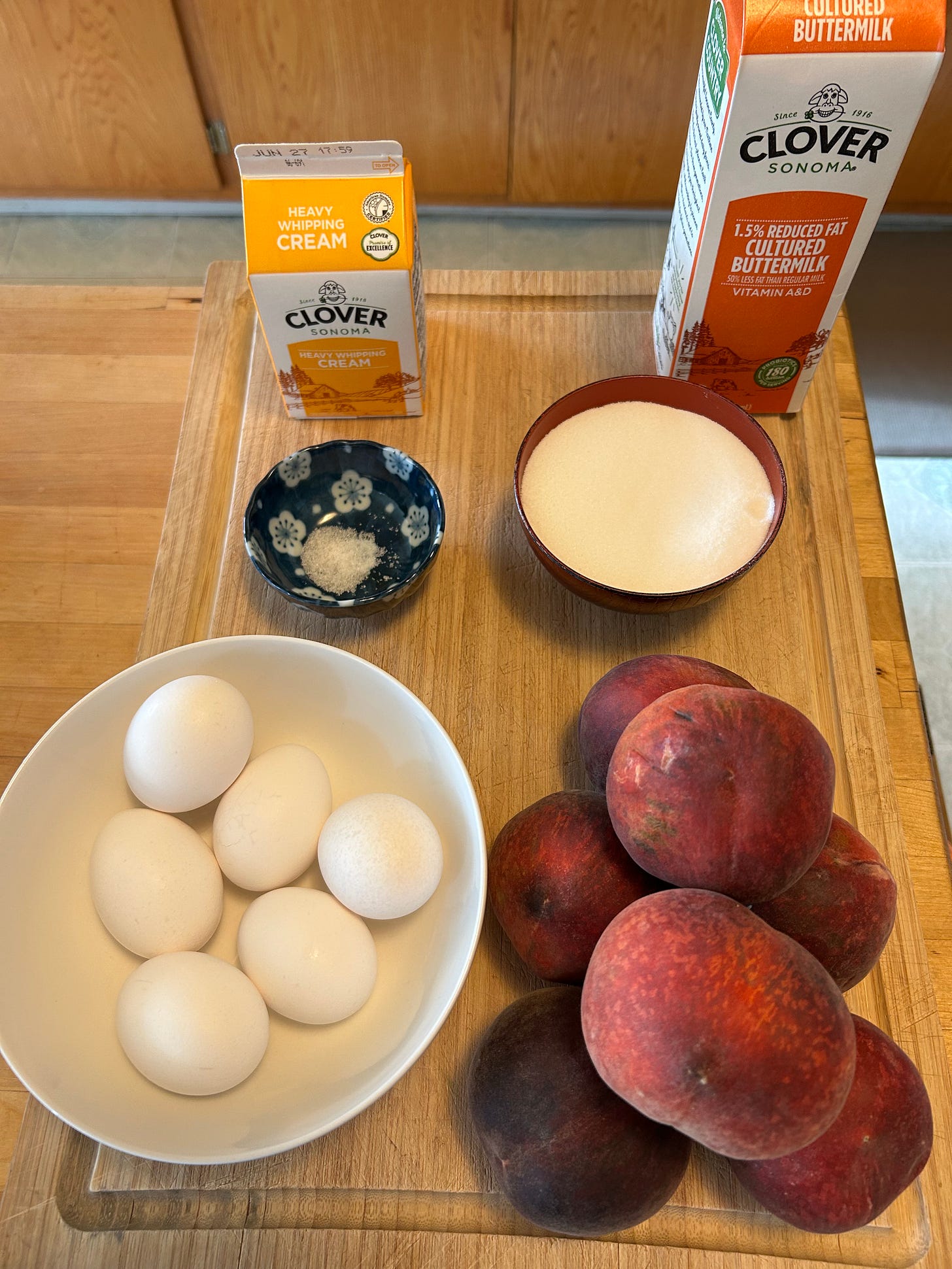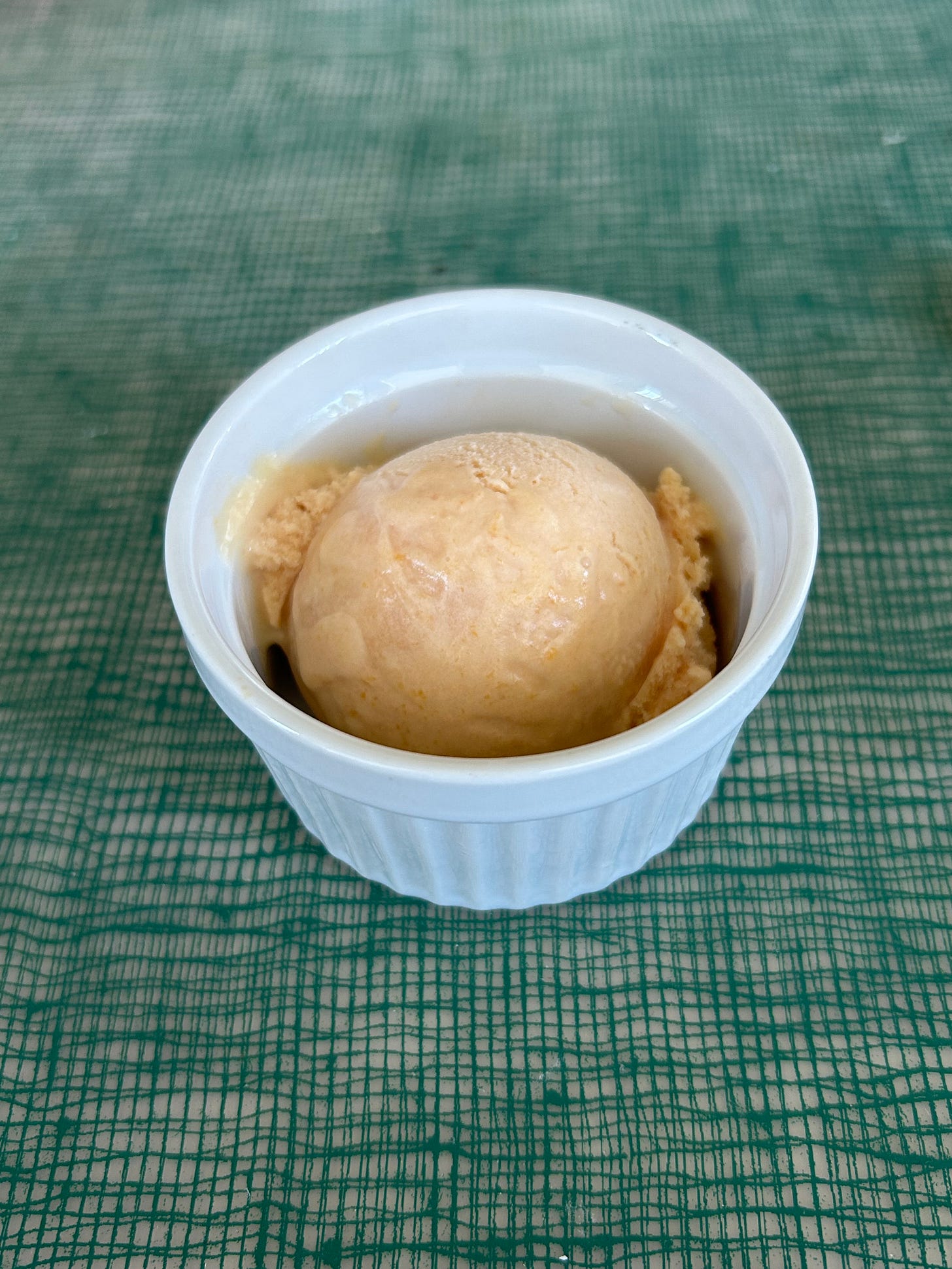There was a moment on Tuesday when I worried I might not get around to making an ice cream this week.1 I’m still feeling the effects of jet lag—which have been more pronounced than usual for me; my brain feels a bit like Jell-O—and I experienced one of those instances where the peaches I purchased just would not ripen properly.
But I managed to pull it together and was able to make a batch, this time using a recipe from Melissa Clark. Before getting into all of that, I wanted to mention that what’s been happening in America over the past two weeks has been weighing heavy on my mind, and I have a few things I want to process / get off my chest with regard to all that. As I said in my very first post for this blog: “I’ll try to keep this space politics-free, but given my tendencies, I make no promises.”
I was initially going to lead with the politics, but I decided to tack it on at the end of the post, for everyone’s sake. It obviously goes without saying, but feel free to skip that part if you’re not interested in me prattling on about the state of the world.
Okay, let’s talk about this week’s ice cream. Melissa’s peach ice cream recipe is, like the Cook’s Illustrated recipe from a few weeks ago, a custard based one. The main differences are Melissa includes a 1/2 cup of buttermilk, doesn’t use vanilla extract, and has you puree the stewed peaches and fully incorporate them into the base instead of keeping them in chunks.
About those peaches pictured above: they never got soft. They were clearly ripening—their skins were becoming loose and wrinkly each day—but they never got soft. I find this can randomly happen with peaches. The reason why it happens, however, remains a mystery to me. I even put them in a brown paper bag with an apple and a banana, and they still didn’t soften. When I cut them up, they tasted fine, but the flesh was still a bit crisp.
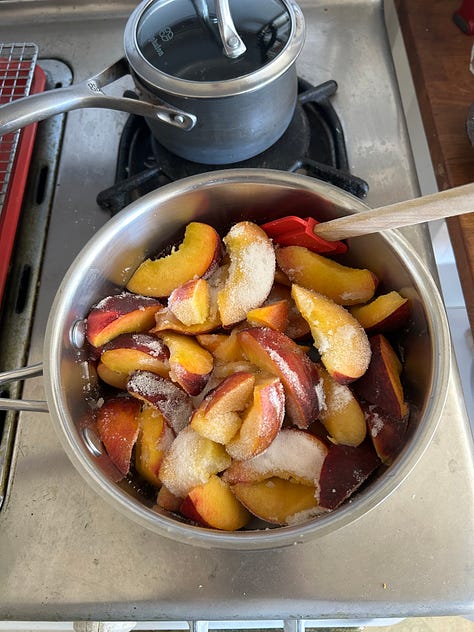


I figured since I was going to cook them—with 1/2 cup of sugar no less!—they would soften up and taste good. And that is indeed what happened. Once they were soft, I pureed and strained them, leaving me with a considerable amount of peach puree. Melissa’s recipe said to use 3 pounds of peaches, and the end result seemed like quite a lot.
The custard making was straightforward. First I did this:
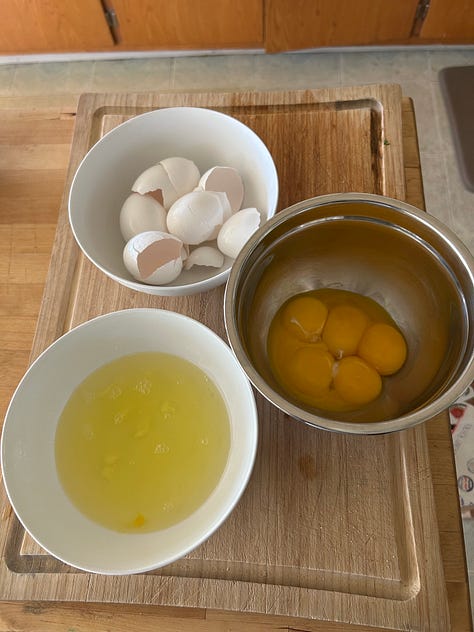

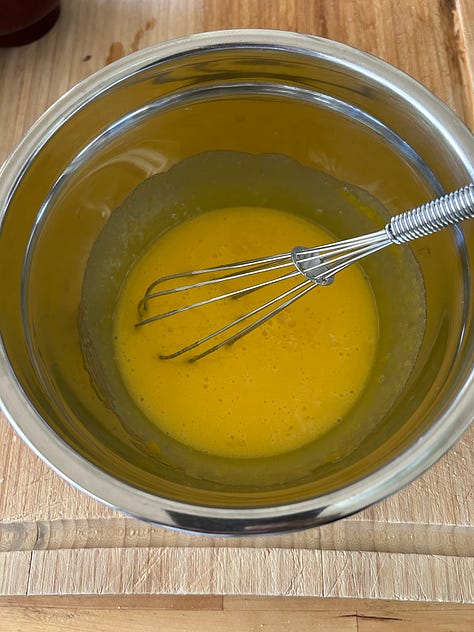
Then this:
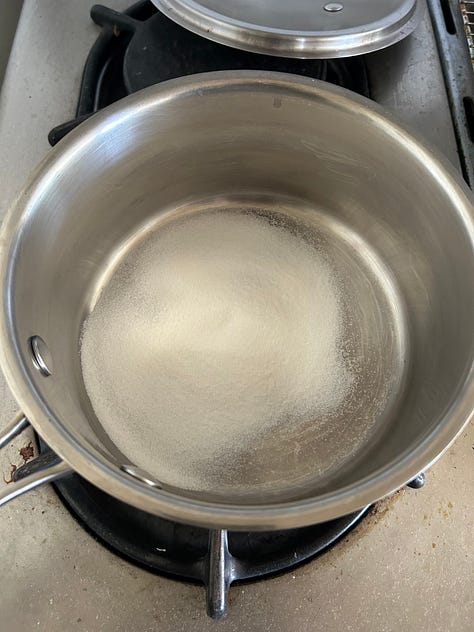
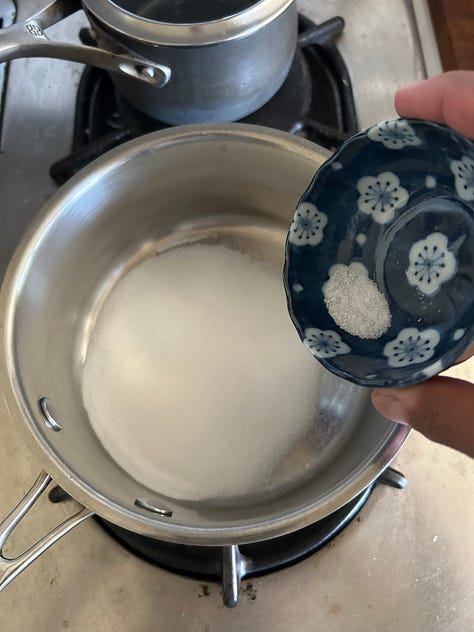
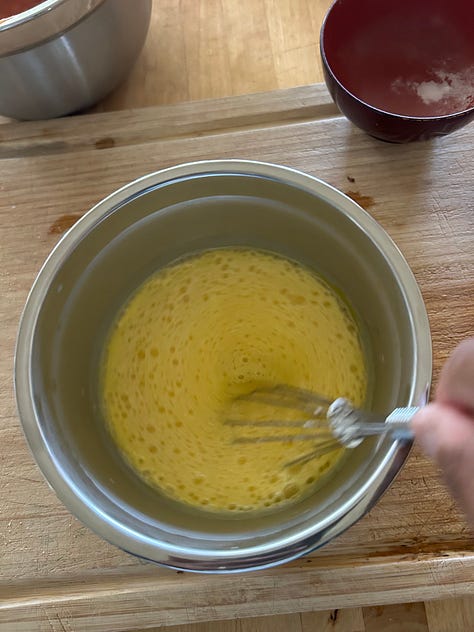
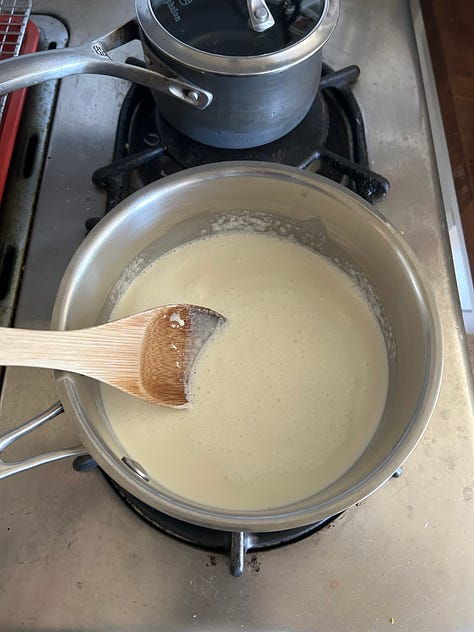
And then this:
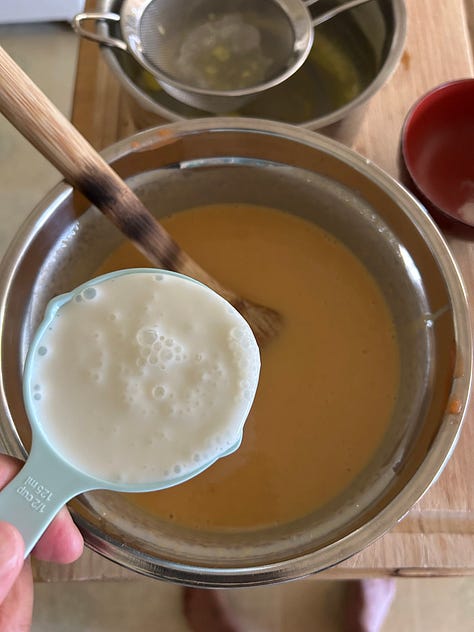
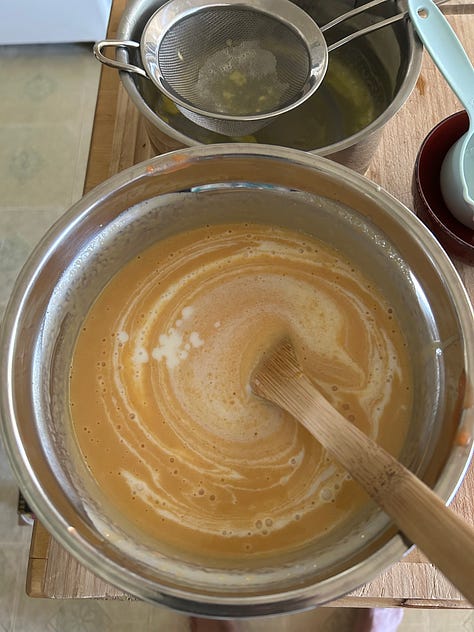
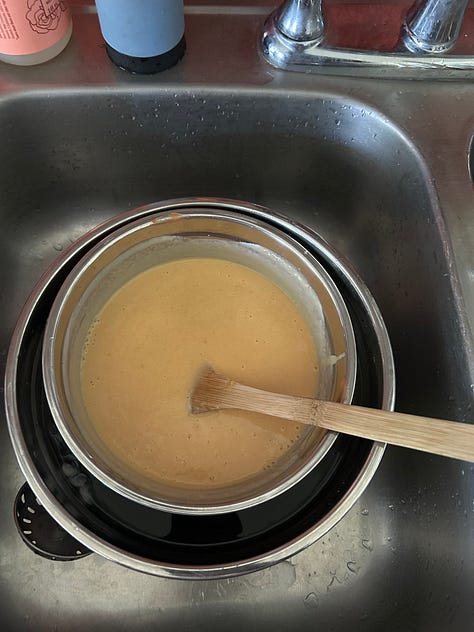
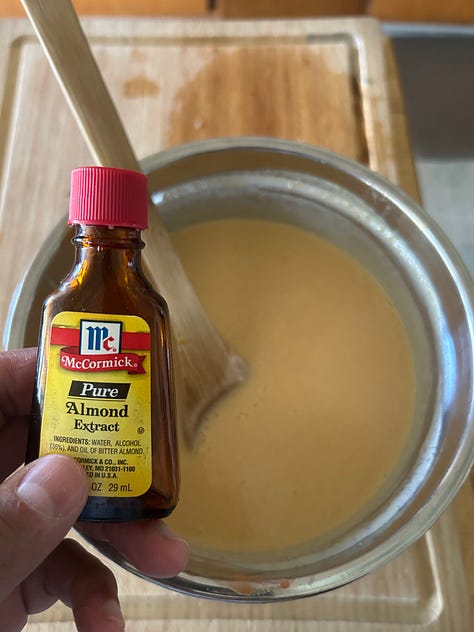
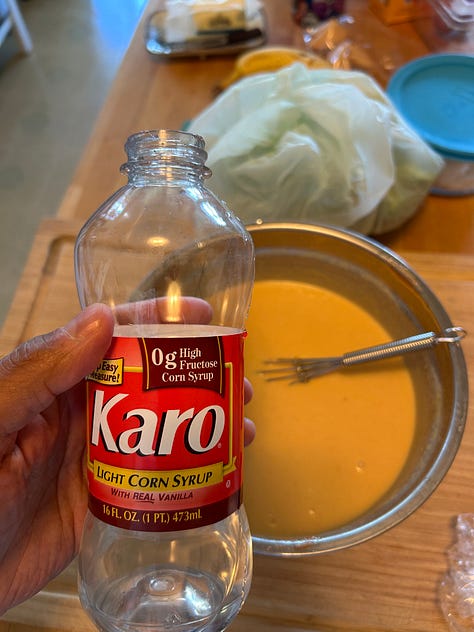

I didn’t get a photo of when I added the peach puree. I added the almond extract because in her recipe, Melissa says you can. And I added 2 tablespoons of corn syrup because I tasted the base and thought it needed to be a tad bit sweeter.
Here’s the churning video, although it’s not really a true churning video. I forgot to take a video during the main churning, but since the quantity of the base mixture was so much, I needed to do a smaller, second churn, and with that one I did remember to video. So this is kind of like a mini-churn video:
And the final results.
It came out good. Great texture and the buttermilk gives it a nice tang. The peach flavor is good, but in spite of all the puree, we felt like the peach flavor could have been stronger. Maybe I shouldn’t have strained it? Or maybe the quality of the peaches wasn’t high enough? I’m not sure.
Overall, a nice result!
Anyway, that’s a wrap on the ice cream. Now, onto the politics…
I’ve been thinking and reading about China quite a bit recently. I can’t pinpoint exactly what led me to this, but part of it was that I had started to notice how the news media and political class in the US constantly portrays China as “aggressive” and “authoritarian” and essentially a threat to the global order. I mean, I had been aware of this phenomenon in a general way for some time, but with rising tensions surrounding Taiwan, and the U.S.’s continued “pivot to Asia,” I guess you could say I started to notice it more acutely.
I find it interesting that the United States characterizes China as an “aggressive” country. Because from a military standpoint, that’s simply not true. China has been involved in very few wars since the CCP came to power in 1949. Sure, they were involved in Korea and Vietnam, but those were brief wars, and they certainly haven’t engaged in the kind of drawn out, bloody, nation-building campaigns the way the U.S. or Soviet Union have over the past 75 years. And that’s in spite of the fact that they share land borders with a large number of nations where the boundary lines are not historically clear cut. Yet they’ve managed to find solutions to most of their disputes with their neighbors without resorting to war.2
The list of nations that the United States has used military force against, on the other hand, is almost too long to count. Here’s one guy’s list of nations where the US military has been involved since World War II. I can’t vouch for all of the examples on that list, but I know for certain that a good number of the nations on the list deserve to be there, and most of those did not attack us first. Suffice it to say, since the end of WWII, we have repeatedly used our military around the globe to achieve our political and economic desires. I’m not stating that as an argument. It’s a simple fact. Part of the reason why we have military bases around the globe (the other day I learned about the US base on Diego Garcia in the Indian Ocean for the first time) is because we use our military quite often, and often in aggressive, bellicose ways.
All of this brought to mind something historian Craig Steven Wilder says towards the end of the Ken Burns documentary The Central Park Five: “I want us to remember what happened that day, and be horrified by ourselves. Because it really is a mirror on our society. And rather than tying it up in a bow and thinking that there is something that we can take away from it, and that we’ll be better people, I think what we really need to realize is that we’re not very good people.”
Wilder was obviously speaking about a completely different context, but it’s worth considering his words as the US embarks on a yet another (unjustified3) preemptive war. Yes, it’s currently a proxy war with Israel doing the attacks. But Trump has made it clear we may get directly involved, and even if we don’t, we supply Israel with almost all of their weapons, and we knew about their attack plans in advance and could have stopped them if we wanted to—so it is kind of our war too. Yet somehow China is the aggressive one and the threat to peace?
Look, part of me is shocked and horrified that we might go down this path yet again. Another part of me feels unsurprised, cynically resigned, and even ready to just give up on America and says “fuck this, we are beyond help.” I know simplistically hating on America is politically immature—it’s something I’ve worked hard to move on from since my younger days—not to mention a tactical dead end—for better or worse, most Americans (including immigrants!) like America, so you can’t win political power with an “America sucks” message. But that’s nevertheless how I feel right now. You take a step back and you examine how our government behaves, and it’s hard not to conclude, as Wilder puts it, that we’re simply not very good people.
I’m trying not to let this sentiment win. I’m trying to remain hopeful for a better America. I’m reminded of the final lines of Homeland Elegies (one of my favorite books of probably the past ten years): “I'm here because I was born and raised here. This is where I've lived my whole life. For better, for worse — and it's always a bit of both — I don't want to be anywhere else. I've never even thought about it. America is my home.” I can’t say I’ve never thought about living somewhere else. But I suppose Ahktar’s sentiment here is as good a guide as any for how to navigate thinking about this political moment.
Let me wrap this up by saying it would be nice if we could, at the very least, be honest as a nation about our motivations. I don’t imagine we’ll ever admit that we’ve been—and continue to be—more of a threat to the world than Iran and China combined. But if we’re going to continue with our aggressive and bullying ways, then we should drop the pretense of caring about ideals like “democracy” and “freedom” and speak honestly. Instead of portraying China as nefarious, just say we don’t want them to be as powerful as us because we control the system, and we like controlling the system, and we don’t want anyone competing with us or challenging our power. With respect to Iran, we should just say we don’t want them to have nuclear weapons because we don’t want them to have the power to say no to our demands. Or simply admit we’re racist and don’t believe Arabs / Muslims can be responsible with an atom bomb.4
In other words, I wish we would, at a bare minimum, cut the high horse bullshit. I know that’s expecting way too much, but if we’re going to commit yet another military atrocity, I could really do without the hypocrisy.
I didn’t even get to the protests in LA and Trump deploying the military, but I’ve already gone on too long, so I’ll end this here.
See you next week.
Which would have been a shame given that I only have seven weeks to go to make it to the one year mark.
How China has behaved domestically is a separate question. There are real discussions to be had about some of their behavior in that regard (as there is for the US, or any nation for that matter). My point here is, they haven’t started any wars.
If you haven’t seen this Daily Show video which shows how Netanyahu has been saying that Iran is only “weeks” or “months away” from a nuclear weapon for the last 30 years, you should definitely watch it.
I find the idea that Iran would actually use a nuclear weapon against Israel to be utterly unconvincing because (a) the MAD argument—Israel (and the US!) would nuke Iran in return and no nation wants to suffer that, which is a big reason why we’ve never seen an actual nuclear war; and (b) Israel is very small geographically, making it impossible to strike it without also impacting Lebanon, Jordan, Syria, Egypt, etc.—not to mention millions of Palestinians. Even if Iran wanted to mass murder Israelis—and despite the Iranian government’s hateful rhetoric toward Israel, I don’t think they actually want to—they wouldn’t want the collateral damage.

